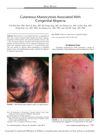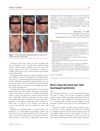 26 citations,
January 2017 in “Acta dermato-venereologica”
26 citations,
January 2017 in “Acta dermato-venereologica” Antidepressants might help with skin inflammation and improve conditions like psoriasis and eczema.
 24 citations,
June 2011 in “International Journal of Dermatology”
24 citations,
June 2011 in “International Journal of Dermatology” Most pregnant women experience skin changes like darkening and itching, while serious skin conditions are rare but need early treatment.
 17 citations,
July 2017 in “International Journal of Behavioral Medicine”
17 citations,
July 2017 in “International Journal of Behavioral Medicine” The Egyptian Arabic Skindex-16 is a reliable way to measure how skin diseases affect quality of life in Egyptian patients.
 11 citations,
October 2011 in “Allergologia et immunopathologia”
11 citations,
October 2011 in “Allergologia et immunopathologia” A girl with Netherton syndrome was able to eat wheat without allergies after a special treatment.
 8 citations,
April 2015 in “Advances in Psychosomatic Medicine”
8 citations,
April 2015 in “Advances in Psychosomatic Medicine” Psychotropic medications can cause skin problems but also treat some skin conditions.
 1 citations,
February 2009 in “Journal of The American Academy of Dermatology”
1 citations,
February 2009 in “Journal of The American Academy of Dermatology” Children's Serum Sickness-Like Reaction is often linked to antibiotics, especially amoxicillin, and involves symptoms like rash, fever, and joint issues.
 1 citations,
January 2000 in “Springer eBooks”
1 citations,
January 2000 in “Springer eBooks” Pregnancy can cause various skin changes and diseases, requiring careful treatment to protect the baby.
 October 2011 in “Dermato-endocrinology”
October 2011 in “Dermato-endocrinology” Hormones significantly affect skin health, with vitamin D playing a key role.
 April 2004 in “Journal of The American Academy of Dermatology”
April 2004 in “Journal of The American Academy of Dermatology” The textbook "Dermatology" is highly recommended for its comprehensive content, user-friendly design, and extensive visual aids.
 59 citations,
June 2022 in “Frontiers in medicine”
59 citations,
June 2022 in “Frontiers in medicine” There are still challenges in diagnosing and treating chronic skin diseases, but there is hope for future improvements.
 40 citations,
January 2010 in “Indian Journal of Dermatology, Venereology and Leprology”
40 citations,
January 2010 in “Indian Journal of Dermatology, Venereology and Leprology” Certain diets can affect skin conditions, but more research is needed to understand these relationships fully.
 25 citations,
July 2014 in “Hong Kong medical journal”
25 citations,
July 2014 in “Hong Kong medical journal” Some skin disorders might be linked to H. pylori infection, but more research is needed to confirm this.
 9 citations,
July 2002 in “Journal of the European Academy of Dermatology and Venereology”
9 citations,
July 2002 in “Journal of the European Academy of Dermatology and Venereology” The document concludes that fexofenadine reduces inflammation in chronic hives, cholestyramine helps half of pregnant women with itchy rashes, and relaxing incisions are a good alternative in facial surgery for the elderly.
 8 citations,
February 2012 in “International Journal of Dermatology”
8 citations,
February 2012 in “International Journal of Dermatology” Runners often face skin problems like blisters and infections, and both prevention and early treatment are important.
 4 citations,
September 2021 in “Frontiers in allergy”
4 citations,
September 2021 in “Frontiers in allergy” The conclusion is that understanding the complex relationship between allergies, autoimmunity, and psychological factors is key to treating skin disorders with itching.
 3 citations,
February 2012 in “The American Journal of Dermatopathology”
3 citations,
February 2012 in “The American Journal of Dermatopathology” A 3-year-old girl with skin mast cell buildup and congenital baldness improved with treatment, suggesting a rare link between these conditions.
 2 citations,
September 2016 in “Journal of evolution of medical and dental sciences”
2 citations,
September 2016 in “Journal of evolution of medical and dental sciences” Thyroid problems are linked to various skin issues, and checking thyroid health is important for people with certain skin conditions.
 January 2017 in “Acta dermato-venereologica”
January 2017 in “Acta dermato-venereologica” The congress showed that psychological therapy can help skin condition patients, social media affects acne stigma, education improves atopic dermatitis, and patient satisfaction in dermatology is high, especially with good doctor engagement.
 June 2016 in “CRC Press eBooks”
June 2016 in “CRC Press eBooks” Sleep problems and skin issues affect each other; poor sleep can worsen skin conditions, and some skin treatments can improve or harm sleep quality.
 January 2016 in “Kafkas Journal of Medical Sciences”
January 2016 in “Kafkas Journal of Medical Sciences” Turkish pregnant women commonly experienced skin issues like itching and acne, and doctors mainly used topical treatments due to safety concerns during pregnancy.
 September 1995 in “American Journal of Contact Dermatitis”
September 1995 in “American Journal of Contact Dermatitis” Antiyeast treatments work better for seborrheic dermatitis than steroids, and other findings include increased skin bacteria under plastic wrap, a nasal cell defect in Staphylococcus aureus carriers, quick resolution of certain skin reactions, high rubber latex allergy in spina bifida patients, and glyceryl monopentadecanoate's effectiveness for male hair loss.

The document concludes that various skin conditions have specific treatments and that adequate calcium intake may prevent osteoporosis.
 5 citations,
July 1991 in “Journal of The American Academy of Dermatology”
5 citations,
July 1991 in “Journal of The American Academy of Dermatology” Hair loss in a woman with eosinophilia-myalgia syndrome improved after stopping L-tryptophan and starting treatment.
 25 citations,
July 2021 in “Journal of Medical Virology”
25 citations,
July 2021 in “Journal of Medical Virology” COVID-19 can cause various skin issues, including rashes and hair loss, which usually heal on their own and don't always indicate severe illness.
 4 citations,
February 2014 in “Journal of the European Academy of Dermatology and Venereology”
4 citations,
February 2014 in “Journal of the European Academy of Dermatology and Venereology” Early diagnosis of hair tourniquet syndrome saved a baby's toe from being lost.
 1 citations,
May 2023 in “Frontiers in medicine”
1 citations,
May 2023 in “Frontiers in medicine” Hair dyes and perms can damage hair and scalp, but using interventions can reduce harm.
 August 2001 in “Journal of Cutaneous Medicine and Surgery”
August 2001 in “Journal of Cutaneous Medicine and Surgery” Prednisone has risks for lupus patients, isotretinoin is safe for mental health, transplant patients risk skin cancer, and various treatments are effective for specific skin conditions.
 37 citations,
June 2021 in “Journal of the European Academy of Dermatology and Venereology”
37 citations,
June 2021 in “Journal of the European Academy of Dermatology and Venereology” Adult skin quickly reacts to short-term environmental and internal stress, leading to various skin issues and the need for protective measures.
 33 citations,
January 2011 in “Elsevier eBooks”
33 citations,
January 2011 in “Elsevier eBooks” Systemic Lupus Erythematosus has varied symptoms and is hard to diagnose, affecting many body parts and requiring careful clinical judgment.
 32 citations,
April 2000 in “Dermatologic Clinics”
32 citations,
April 2000 in “Dermatologic Clinics” Skin diseases, especially psoriasis, greatly affect people's quality of life, similar to chronic diseases.






























